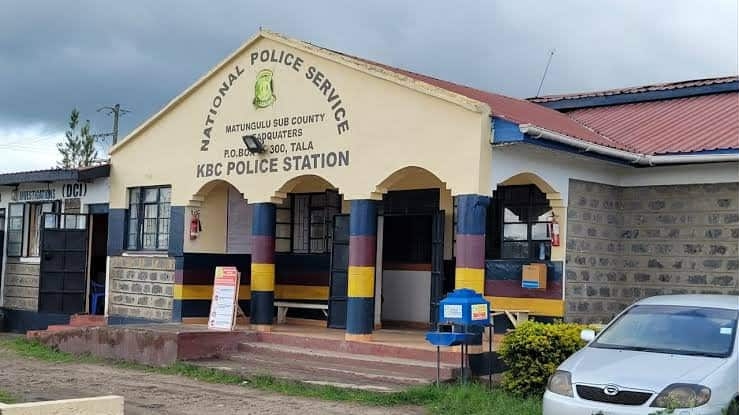Watson Wachira knows too well that the food he produces on his farm must be safe.
Before training, he was among farmers who could just produce food to satisfy the ever-increasing needs of consumers. Today, he has embraced sustainable food production processes.
“Before the training, we were producing food in an unsustainable manner, compromising both human life and the environment,” Wachira, who hails from Njambini in Nyandarua county, says.
He adds that good agricultural practices lead to quality food, which is safe and is traceable.
Nyandarua county is known for the production of crops such as potatoes and vegetables, as well as dairy products.
Wachira now provides several services to the farmers following his training.
“I help farmers with training on several things such as conservation agriculture, the issue of certified seeds and the safe use of pesticides. I also train them on proper disposal of chemical containers.”
Wachira says some of the farmers store pesticides in their bedrooms.
The farmers, he adds, are not aware of the number of days crops are not harvested for consumption after spraying with pesticides, otherwise known as a pre-harvest interval.
The pre-harvest interval is the wait time between a pesticide application and when a crop can be harvested.
Wachira has been trained by various institutions such as Kenya Agricultural and Livestock Research Organization and Farm to Market Alliance, among others.
He says the more than 500 farmers he has trained have benefitted immensely. “They now follow protocols on safe use of pesticides and productivity has improved.”
Wachira says most of the farmers do not read instructions on how to use pesticides, hence the need to train young people as spray service providers. So far he has trained 25 - all with personal protective equipment.
“We identified youth before being trained by partners such as CropLife Kenya,” he adds. A total 2,460 spray service providers have been trained across the country, with each earning up to Sh 2,000 per day.
Wachira, who keeps a record of all farmers he has trained, says spraying is technical and needs someone with some level of understanding.
On his farm, he practises conservation agriculture by avoiding the use of disc plough. Instead, he uses a chisel to prevent soil disturbance. He also uses traps to contain pests.
Wachira adds that conservation agriculture has helped improve productivity and lowered the cost of production. This has led him to the practice of aggregation for some of the crops before looking for market.
“I have five companies and five off-takers for potatoes. We are 100 farmers in Nyandarua.”
aak-GROW stewardship manager Benson Ngige says capacity building for farmers has not only improved production but also protected lives.
“Pesticides have precaution that needs to be adhered to. Disposal of pesticide bottles must also be done properly. We have stations to collect such bottles before taking them to the National Environment Management-registered incinerators for safe destruction,” he adds.
aak-GROW, also known as CropLife Kenya, is the umbrella organisation in Kenya for producers, manufacturers, importers, formulators, re-packers, distributors and users of pest control products.
It is the national representative of the international agrochemical industry represented worldwide by CropLife International.
The organisation's regulatory manager Joel Mutai says there is a need for sustainable food production that ensures better farming, better food and better health.
“Farmers need to use integrated pest management to manage pests before going to the use of pesticides,” he says, noting that a section of farmers do not follow instructions.
aak-GROW CEO Eric Kimunguyi says there is a need to continually raise awareness on counterfeit pest control products and build the capacity for farmers to produce sustainably.
Globally, food consumers are becoming more sensitive to safety standards.
Many people now want to know whether the food is safe, where they are grown and what farm practices are observed.
The consumers want to know if the farmer followed guidelines for safe and sustainable crop production, maximising yield while minimising costs and environmental impacts.
The maximum residue level defines the amount of pesticide residue that is legally allowed on the harvested food.
The maximum residue levels are globally set by Codex Alimentarius, a global food standard programme by the Food and Agriculture Organization of the UN and the World Health Organization.
Some countries fully adopt Codex maximum residue levels while others set their national maximum residue levels through local risk analysis, but often refer to Codex in the absence of national standards.
Kenya Standard 1758:2016 (KS 1758) is a code of practice for the horticulture industry in Kenya which stipulates the hygienic and safety requirements during the production, handling and marketing of flowers & Ornamentals, fruits, vegetables, herbs and spices.
The standard is in two parts: Part 1-floriculture and part 2- fruits and vegetables.
The standard applies to all operators in the horticulture value chain including but not limited, to breeders, propagators, producers, consolidators, traders, shippers and cargo handlers for local, regional and international markets.
The standard was developed in line with domestic and international protocols on food safety, workers' health and safety, environment and good agricultural practices.
This is intended to enhance farm assurance systems, compliance with relevant laws of Kenya and strict adherence to the safe use of chemicals.
The standard is administered by a secretariat hosted at AFA-Horticulture Crops Directorate, with the secretariat drawn from industry stakeholders.
The standard has implementation guidelines that define the rules for trainers, laboratories, inspectors and certification agencies participating in the implementation and conformity assessment of the KS 1758 standard.
Certification to the standard is achieved through accredited certification organisations.
Operators are required to comply with the requirements of the standard at all times.
Under the strategic plan 2023-27, the Pest Control Products Board, which seeks to be a world-class regulatory agency for pest control products, hopes to enhance compliance of pest control products with set standards and facilitate trade and ensure safe, quality and efficacious pest control products are availed to users.
PCPB chief executive Fredrick Muchiri says his organisation seeks to promote responsible handling and use of pest control products, enhance compliance with food safety standards and market requirements and improve resource mobilisation and accountability, quality and efficiency of service delivery.
“The registration process of pest control products is an important regulatory component of authorising PCPs in the country. The process ensures that products that are of good quality, safe and efficacious are availed to farmers and for use in public health,” Muchiri says.
Recently, there has been concern about the use of molecules which has triggered review to address safety to human health and environment.
Muchiri says they undertake compliance and enforcement inspection of all pest control products dealers to ensure compliance with the law and certify that products in circulation meet set standards.
Those that do not comply are seized.
PCPB also undertakes capacity building for responsible handling and use of pest control products.
















